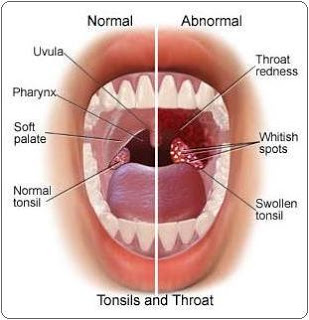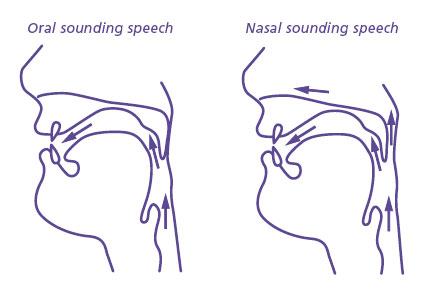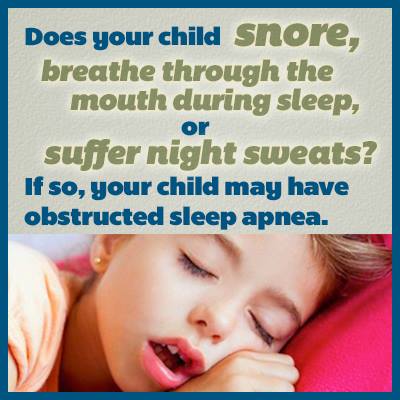Tonsils and Adenoids – How Do They Impact Speech?

Image Courtesy of medimiss.net
Are you familiar with what your tonsils and adenoids do? Plug your nose and try to have it not affect the quality or clarity of your speech. You voice changes because you have just blocked an important part of what your body uses for verbal communication – the nasal passageway. This is often the same result you get when you have a cold or allergies, but it could also be a case of enlarged tonsils and adenoids that are preventing clear speaking from occurring.
What Are Tonsils and Adenoids?
Your tonsils are visible, located at the back of your throat on either side, and they are responsible for producing antibodies to help fight those pesky nose and throat infections from spreading to the neck or even into the bloodstream. Think of them as a germ filtration system. Your adenoid is a mass of tissue that is located at that mysterious meeting point between your nasal passageway and your throat, which you can’t see by opening your mouth. Like the tonsils, your adenoid helps your immune system recognize and fight off germs.
Children tend to have larger tonsils and adenoids, which is usually thought to be because children are exposed to so many new germs in the first few years of life and it is the job of the tonsils and adenoids to process all of these viruses. By the time most people are adults, their bodies have encountered viruses, their bodies have already processed them, and the tonsils and adenoids no longer have to take note of them.
How Do Tonsils and Adenoids Affect Speech?
Speaking with a sore throat can not only be painful, but it changes the quality and tone of your voice. If you or your child has enlarged tonsils, often due to an infection, it can make your voice sound hoarse or muffled and affect the resonance. This can in turn lead to academic problems, especially in children who are learning to read. If the adenoid is enlarged it can increase the likelihood that your voice will have a nasal quality, or sound like you are plugging your nose, because your adenoid is doing the plugging for you. Tonsillectomy and adenoidectomy that remove the tonsils and/or adenoid are sometimes the only choices physicians feel patients have in order to return breathing and speaking capabilities to healthy levels. Sometimes it is determined that surgery is not warranted as many children will outgrow these enlarged tissue problems by the time they hit puberty.
Because the adenoids cannot be seen without assistance from medical imaging (scopes or x-rays), it can be challenging to tell the difference between enlarged adenoids or allergy problems. Sinusitis (an infection of the sinuses) can present with several similar symptoms as well, and often requires an assessment by a physician to determine if it is caused by a virus or bacteria. Doctors and speech therapists might also need to evaluate whether or not the speech is affected by tongue thrust, a condition that has several symptoms that are similar to enlarged tonsils and adenoids. All of these conditions can give your speech a nasal quality or make your speech more difficult to understand.
Does Speech Therapy Help Communication Challenges Caused by Enlarged Tonsils and Adenoids?
While vocal pitch, tone, and articulation can be negatively affected by enlarged tonsils and adenoids, speech therapy cannot easily provide improvement as long as the enlarged tissues remain so swollen. It would be similar to starting with physical therapy for a broken leg before placing the cast on the leg to heal the break.
For those patients who have endured enlarged tonsils and adenoids for longer periods of time, especially children, speech therapy can play an important role in rehabilitation of healthy communication. Children who become accustomed to interference caused by swollen tissues in the throat and nasal passages sometimes benefit from exercises to strengthen those areas.
What Other Problems Do Enlarged Tonsils and Adenoids Cause?
If you or your child has enlarged tonsils and adenoids, it might not be a surprise that speech difficulties aren’t the only problems. Several other conditions can cause physicians to consider removing tonsils and adenoids.
- Difficulty breathing
- Snoring and sleep apnea tied to enlarged tonsils and adenoids
- Fatigue during the day because of interrupted sleep at night
- Frequent ear infections because fluid is prevented from draining from the middle ear – which can also cause speech delays
- Recurrent nasal infections which can also affect the quality of speech
If any of these signs and symptoms of enlarged tonsils and adenoids, or any of the other above conditions, sound like something with which you or your child are struggling, seek the advice of your physician to determine which treatments, including speech therapy, may help you regain your health.




